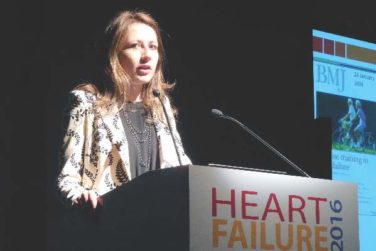REPORTING FROM ACC 18
ORLANDO (FRONTLINE MEDICAL NEWS) – Patients who received vouchers to cover copayments were more likely to receive prescriptions for more effective antiplatelet medication, according to data from a multicenter, randomized trial.
“We know that guidelines are very clear; we need to treat patients with antiplatelet therapy for 12 months,” and that the most potent drug, ticagrelor, should be used, Tracy Wang, MD , of Duke University, Durham, N.C., said in a video interview at the annual meeting of the American College of Cardiology. However, in the United States, clopidogrel, though less effective, is prescribed much more often, and many patients discontinue their P2Y12 inhibitor therapy within the first year because of cost, she added.
“We hypothesized that, by reducing the out of pocket costs, treatment would be more evidence driven, rather than driven by what patients could afford,” she said.
The Affordability and Real-World Antiplatelet Treatment Effectiveness After Myocardial Infarction Study ( ARTEMIS ) included 11,001 MI patients at 301 hospitals across the United States. Patients in the treatment hospital group received a voucher to use at a pharmacy or through a mail-order pharmacy to reduce out of pocket costs. Randomization occurred at the hospital level, and hospital characteristics were similar between the groups.
Overall, patients in the treatment group were significantly more likely to receive a prescription for ticagrelor than clopidogrel (60% vs. 36%); 55% and 32% of patients in the usual care group were prescribed ticagrelor and clopidogrel, respectively. Nonpersistence, defined as a gap in P2Y12-inhibitor use of at least 30 days within 1 year, was significantly lower in the treatment group than it was in the usual care group based on patient reported analysis (13% vs. 16%).
However, the incidence of major adverse cardiac events was roughly 10% in both groups. The similar outcomes may stem from the fact that 28% of patients with vouchers did not fill their prescriptions for reasons that the study did not explore, said Dr. Wang.
All patients had health insurance: 64% private, 42% Medicare, 9% Medicaid. The average age of the patients was 62 years, and 31% were women. Patient demographics and clinical characteristics were similar between the groups.
The vouchers affected choice of treatment but didn’t help clinical outcomes, which suggests that copayment reduction should be part of a broader strategy to help patients with adherence over time, said Dr. Wang.
Next steps for research include taking a subset of patients who are more likely to be nonadherent and at high risk for adverse events and targeting them for additional intervention, she noted.
Discussant Craig J. Beavers, PharmD , of the University of Kentucky College of Pharmacy, Lexington, agreed that a multipronged approach is needed to get patients to take their medicines. “We have to figure out what other barriers there are,” he said. “The real trick is, even if you lead a horse to water, how to get them to drink it,” he said.
The study was funded by AstraZeneca. Dr. Wang disclosed relationships with companies including Gilead Sciences, Merck, and Sanofi Pasteur. Dr. Beavers had no financial conflicts to disclose.
SOURCE: Wang T. ACC 18.





